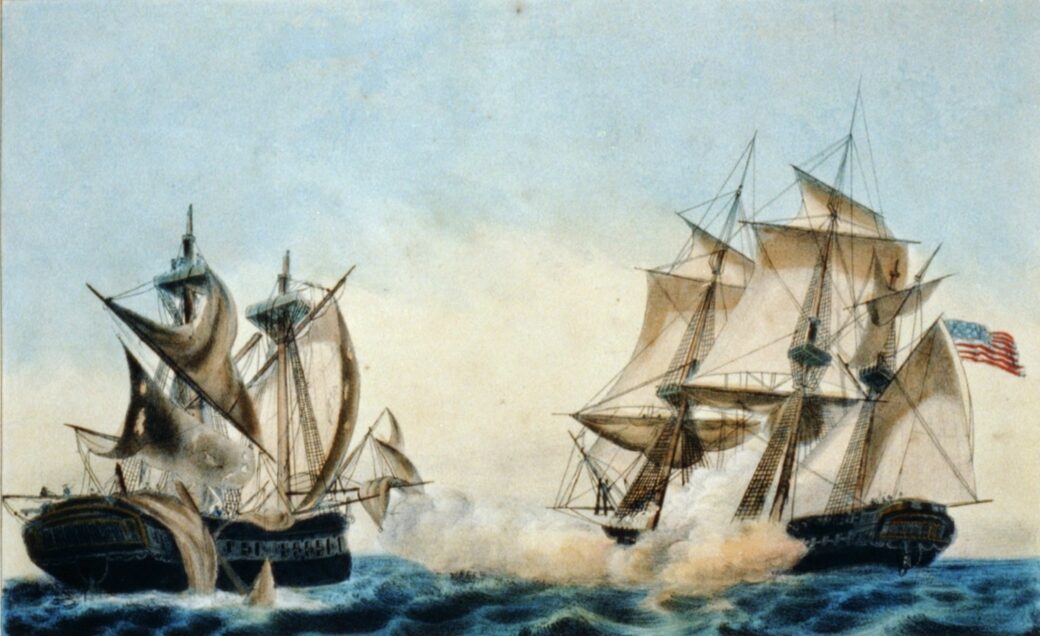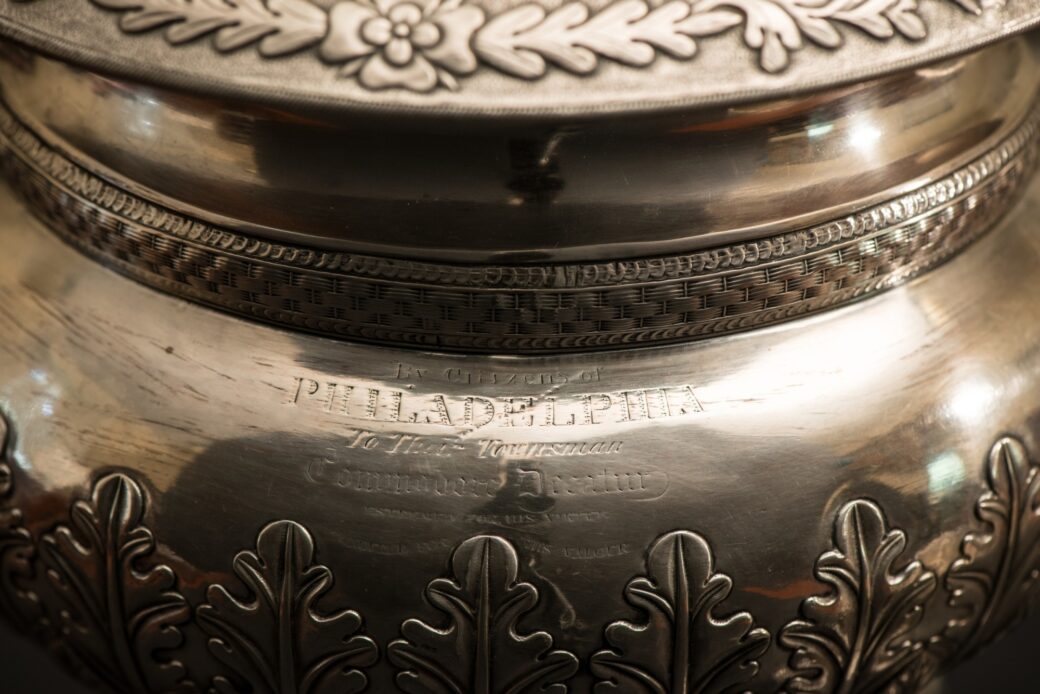Collection Weddings and the White House
From First Lady Dolley Madison's sister Lucy Payne Washington's wedding in 1812 to the nuptials of President Joseph Biden and First...
Main Content
How Long? 4 minutes

Stephen Decatur Jr. (1779-1820) by John Vanderlyn, Oil on canvas, c. 1815. This portrait shows Decatur in his Naval uniform.
White House Historical AssociationIn President Theodore Roosevelt’s description of the capture of the HMS Macedonian by the USS United States in his 1882 book The Naval War of 1812, the future president wrote, “Commodore Decatur handled his ship with absolute faultlessness,” and explained how through Decatur’s bravery and fortitude, a “skillful crew, ably commanded,” was able to defeat their British foes. In this and other engagements during the First and Second Barbary Wars, the Quasi-War with France, and the War of 1812, Commodore Stephen Decatur fought with daring and courage, capturing the imagination of the American public and becoming a national hero.
Born in Maryland on January 5, 1779, Decatur was raised in Philadelphia, his family being prominent members of that city. His father Stephen Decatur, Sr. served as a privateer in the American navy during the American Revolution. In 1798, President John Adams appointed Stephen Decatur, Jr. a midshipman in the U.S. Navy, and Decatur initially served on the frigate USS United States under Commodore John Barry.

This lithograph depicts the fight between the USS United States, commanded by Stephen Decatur, and the HMS Macedonian near Madeira on October 25, 1812. The Macedonian became the first British warship to ever suffer the humiliation of being brought into an American harbor following defeat at sea.
Library of CongressDecatur rose to prominence during the First Barbary War against North African pirates preying on U.S. ships. In 1804 he spearheaded a mission to recapture, and if necessary destroy, the USS Philadelphia, a frigate taken by the pirates in Tripoli harbor.
On the night of February 16, Decatur led a small assault force disguised as Maltese sailors from the ketch Intrepid and moored next to the Philadelphia. Decatur gave the command and 60 American sailors, mostly hidden below deck, boarded the Philadelphia and overpowered the pirates. Finding the Philadelphia unseaworthy, Decatur ordered her burned and his men made their escape from Tripoli harbor from the Intrepid. Tradition has it that Britain’s renowned admiral Horatio Nelson described the recapture and burning of the Philadelphia as “the most bold and daring act of its age.” This audacious and successful operation led to Decatur’s promotion to Captain at age 25, the youngest person to attain that rank in the history of the U.S. Navy.
During the War of 1812, Britain's navy began the conflict with a numerical advantage over the United States in terms of both ships and sailors. Despite its shortcomings, the American Navy used resourcefulness and innovation to deliver victories against the British. Decatur burnished his fame on October 25, 1812, when his frigate the USS United States captured the frigate HMS Macedonian

This wine cooler was presented to Commodore Decatur by the City of Philadelphia on February 11, 1818. The complete service, of which this forms a part, was made by Whartenby & Bumm silversmiths of Philadelphia.

A closer view of the wine cooler features the inscription which reads, "By citizens of Philadelphia to their townsman, Commodore Decatur. Esteemed for his virtue, honored for his valor."
The White House Historical Association and Decatur House, a National Trust SiteAfter the end of the War of 1812, the United States decided to eliminate the North African Barbary States’ continuing menace to American commerce in what is called the Second Barbary War. Decatur sailed his squadron to the Mediterranean in May 1815 and, in an early example of “gunboat diplomacy,” persuaded Algiers, Tunis and Tripoli to sign treaties of peace. After returning to the United States in November 1815, Decatur was named to the Board of Naval Commissioners, headquartered in Washington.
Decatur invested his share of reward money from the HMS Macedonian in real estate near the White House. Decatur and his wife Susan commissioned Benjamin Henry Latrobe, America’s first professional architect and engineer, to design a home “fit for entertaining.” In 1818-1819 they erected a square three-story red brick Federal-style town house on the northwest corner of today's Lafayette Square. There they lived affluently, hosting numerous parties attracting a wide array of Washington dignitaries.

Decatur House, c. 1822, two years after Commodore Decatur's death.
Commodore Decatur occupied the house for barely over one year. He was mortally wounded in a duel, after a long simmering personal and professional dispute with Commodore James Barron, on March 22, 1820, in Bladensburg, Maryland. After the duel, Decatur was brought to his home, succumbing to his wounds later that night. Despite the tragic circumstances surrounding his death, he was mourned throughout the city and the country.
One of the nation’s first heroes of the post-Revolutionary generation, Decatur’s influence on the early development of the U.S. Navy is still honored today through numerous tributes including town and school names across the country, as well as having five U.S. Navy ships named after him. His elegant townhouse, built in such close proximity to the White House, symbolized Decatur’s vision of not only his own social and professional advancement, but a vision of the city’s future prosperity as the capital of a growing nation.
From First Lady Dolley Madison's sister Lucy Payne Washington's wedding in 1812 to the nuptials of President Joseph Biden and First...
Native Americans hold a significant place in White House history. For thousands of years, Indigenous peoples, including the Nacotchtank and...
Since the White House was first occupied by President John Adams in 1800, influential people and organizations—or those who hoped to...
The collection of fine art at the White House has evolved and grown over time. The collection began with mostly...
For two hundred years, Decatur House has stood as a near neighbor to the White House across Lafayette Square. Stewart...
The young national capital at Washington, D.C. became the center of the War of 1812 with Great Britain during the...
In 1816, Commodore Stephen Decatur, Jr. and his wife Susan moved to the nascent capital city of Washington, D.C. With...
by Lauren McGwin In this article, author Lauren McGwin looks at the complexities surrounding Maria Monroe's limited 1820 wedding invitation list....
JAMES ARCHER ABBOTT is the Executive Director of the Lewes Historical Society in Lewes, Delaware. His publications include JANSEN, JANSEN...
NUMBERS 1 THROUGH 6 (COLLECTION I) WHITE HOUSE HISTORY • NUMBER 1 1 — Foreword by Melvin M. Payne 5 — President Kennedy’s Rose Garden by Rachel Lambert...
2023 2023 Communicator Awards White House History Quarterly 65: Every President Has Walked These Grounds, Award of Excellence, Design Features, Copywriting for Corporate...
Official Residences Around the World by Abby Clouse-Radigan This survey of the official residences and offices of some fifty nations...